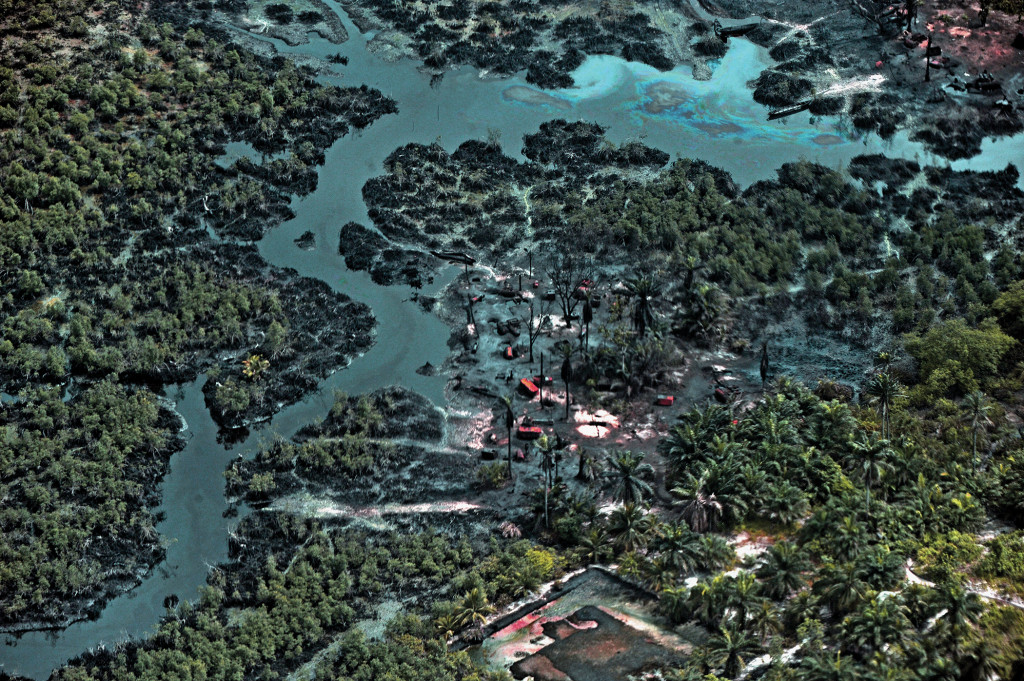Gulf of Guinea Nations Will Have to Navigate Activities on Land and Sea to Combat Oil Theft
When an automobile runs low on petrol, Benin offers two options. The driver can tool into the nearest service station and fill up at regular prices, or he can stop at one of many roadside tables featuring an array of bottles, jugs and cans.
The various bottles may once have held water, rum or vodka. Even empty Fanta soda bottles find new life in this enterprise. Now they all contain the same liquid: an amber elixir called “kpayo.”
Kpayo, a term applied to many counterfeit goods in Benin, loosely means “fake oil.” It can be engine oil or petrol of questionable or poor quality. Because of its low cost, kpayo is hugely popular with the thousands of motorcycle taxis in Benin, known as zémidjans. It’s also vital to many families struggling to make ends meet.
One Beninese man with a wife and four children said he has sold the fuel for four years.
“I trained as an electrician,” he said. “But there are no jobs. That is why I started this trade. So I talked to my friends who told me they make a living out of this business.”
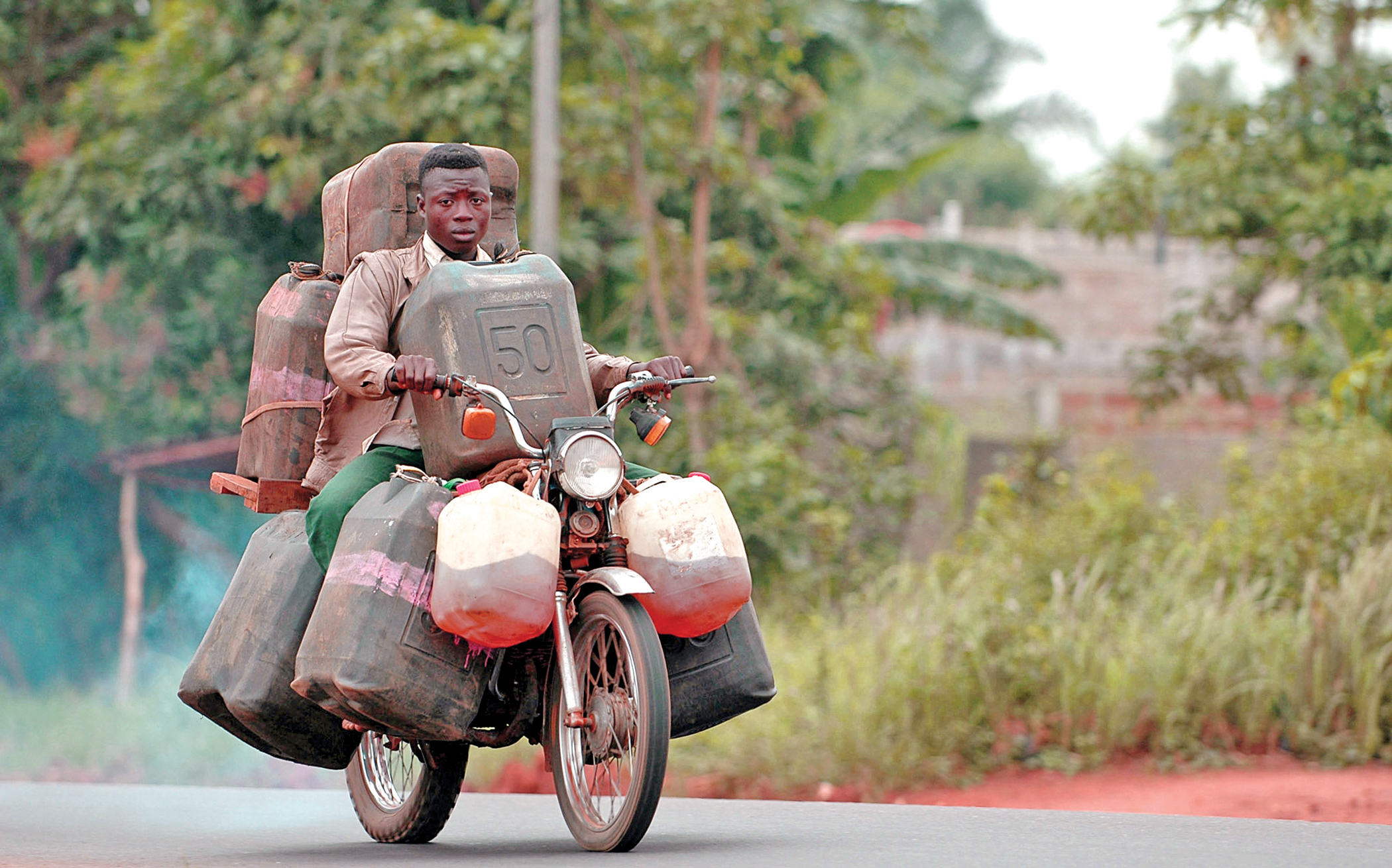
The fuel comes across the border via back roads and backwaters. Motorcyclists will hang several big containers on themselves as they ride in. Smugglers stuff multiple drums on large canoes known as Cotonou boats. Sometimes these black marketeers buy petrol at Nigerian service stations at low, subsidized prices and bring it to Benin, where it sells on roadsides for substantially less than local station prices.
The practice is only one end of a broad spectrum of oil-related crime that bedevils the entire Gulf of Guinea region and beyond, from Angola to as far north as Senegal. As oil companies continue to procure concessions to explore and drill in the exclusive economic zones of multiple countries, the region and the world are seeing the potential — and problems — that accompany the discovery of oil.
Oil-related crime is so widespread and so devastating that the Coastal and Maritime Surveillance Africa (CAMSA) conference devoted a full day of its three-day March 2015 event in Accra, Ghana, to protecting the sector’s infrastructure. Several days later, Exercise Obangame Express, a huge annual multinational naval exercise, included oil-related crime in two of its four major sea-based training scenarios. African nations and their partners are aware of the threats and are educating themselves on how best to confront them.
THE COMPLEXITY OF WEST AFRICAN OIL CRIME
Oil can be an economic boon if its wealth is shared and reinvested. It can be a nightmare if land- and sea-based infrastructure goes unprotected. And the two arenas are not isolated from each other. Corruption and greed can give rise to social unrest that causes crime and destruction of infrastructure, and, by extension, the environment.
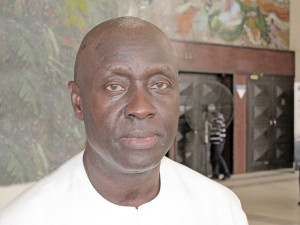
In many places, oil work and village life exist uneasily side by side. Eric Kwame Tettey, research and investigations advisor for oil company Tullow Ghana Ltd., thinks that human activity close to oil and energy infrastructure is the biggest threat in Ghana for now. Drilling rigs at sea offer an example. They cost millions to build and millions to operate daily.
“So you can imagine if one fisherman’s net — just a net — gets entangled into that, and we don’t work for one day, two days, three days trying to correct that,” Tettey said. “You can imagine the chain effect it can cause to business.”
Land-based infrastructure is especially vulnerable to civil unrest, such as that fueled by a combination of poverty, unemployment and anger over corruption, Tettey said.
Nigeria, where oil was discovered in 1956, is an object lesson for how civil unrest can cripple the industry. Within two years, production had begun in the Oloibiri district of the Niger Delta. The area holds the distinction of having Nigeria’s first commercial oil well and producing the nation’s first crude oil export. But for years since, citizens have decried the lack of local financial benefit from oil riches. That dissatisfaction has grown into sustained unrest in the Niger Delta, where the Niger River stretches more than 300 fingers into the Gulf of Guinea.
Militants and common thieves for years have tapped corporate oil lines to siphon off crude for themselves. Sometimes they set up makeshift refineries that resemble illegal liquor distilleries. Jerry cans full of petrol and crude make their way into Benin and elsewhere along back roads. On the other end of the crime spectrum, oil tankers carrying many metric tons of crude suddenly will vanish from their berths. They turn up days later miles away at sea and sucked dry of their product through ship-to-ship transfers.
Where did the oil go? Who took it? How were they paid? Is it part of a larger criminal enterprise that involves drugs and other forms of smuggling? If so, how? These questions only begin to scratch the surface of the complexity that confronts Gulf of Guinea nations. This is the challenge of oil-related crime.
THE SEA AND THE LAND ARE CONNECTED
As West African military, security and corporate officials gathered at CAMSA, a common theme emerged and was echoed at Obangame Express: Crime at sea begins on land.
Retired Vice Adm. Dele Joseph Ezeoba, Nigeria’s former chief of naval staff, hammered home that seemingly simple axiom at CAMSA with the fervor of an evangelist. “There is no criminality at sea that does not originate from the land. True or false? True or false?” he said to his audience. “So the issue of our backwaters or inland waters, which we consider an exclusive reserve, in terms of rights to protect, must be seen as the starting point for the fight against criminals at sea. Because even when they are finished with the criminal illegalities at sea, they go back to what? To the land.”
Nigeria’s Niger Delta region is rife with oil lines. Thieves commonly pound taps into the lines and siphon or divert oil for resale or small-scale refining. The practice has resulted in multiple spills that have turned the once-pristine delta into an environmental disaster area. So, on one level, you have a cyclical condition in which a disaffected population turns to the pipelines and causes spills. This damages the entire ecosystem and is Nigeria’s single greatest maritime threat, Ezeoba told ADF. The result denies “people access to their primary means of livelihood, which is fishing or subsistence agriculture.”
So they see the pipelines as their only means of survival. They tap them, and the cycle repeats itself and worsens. Economic inequality and other social conditions create the conditions for crime on land. Opportunity is what draws the criminals to the sea, Ezeoba said.
“They’re out there at sea, largely ungoverned, because of the vast expanse. They can have a free rein to perpetrate criminality,” Ezeoba said. “And when they’re finished committing their atrocities at sea, they still go back to land, to share their loot and spend whatever they have gotten on land. So it becomes very pertinent that we must institute a structure that will cut out their ability to leave the land and go out to the sea. That is where the inland or backwaters become very, very important.”
In Nigeria, for instance, lakes and rivers are the responsibility of customs, immigration and marine police officials. When capacity is lacking in such agencies, naval forces, which use the waterways to get to the sea, may have to step in.
“What becomes very pertinent is to create a platform that will allow for interface and overlapping of their activities with respect to intelligence gathering,” Ezeoba said. “That is what is key.”
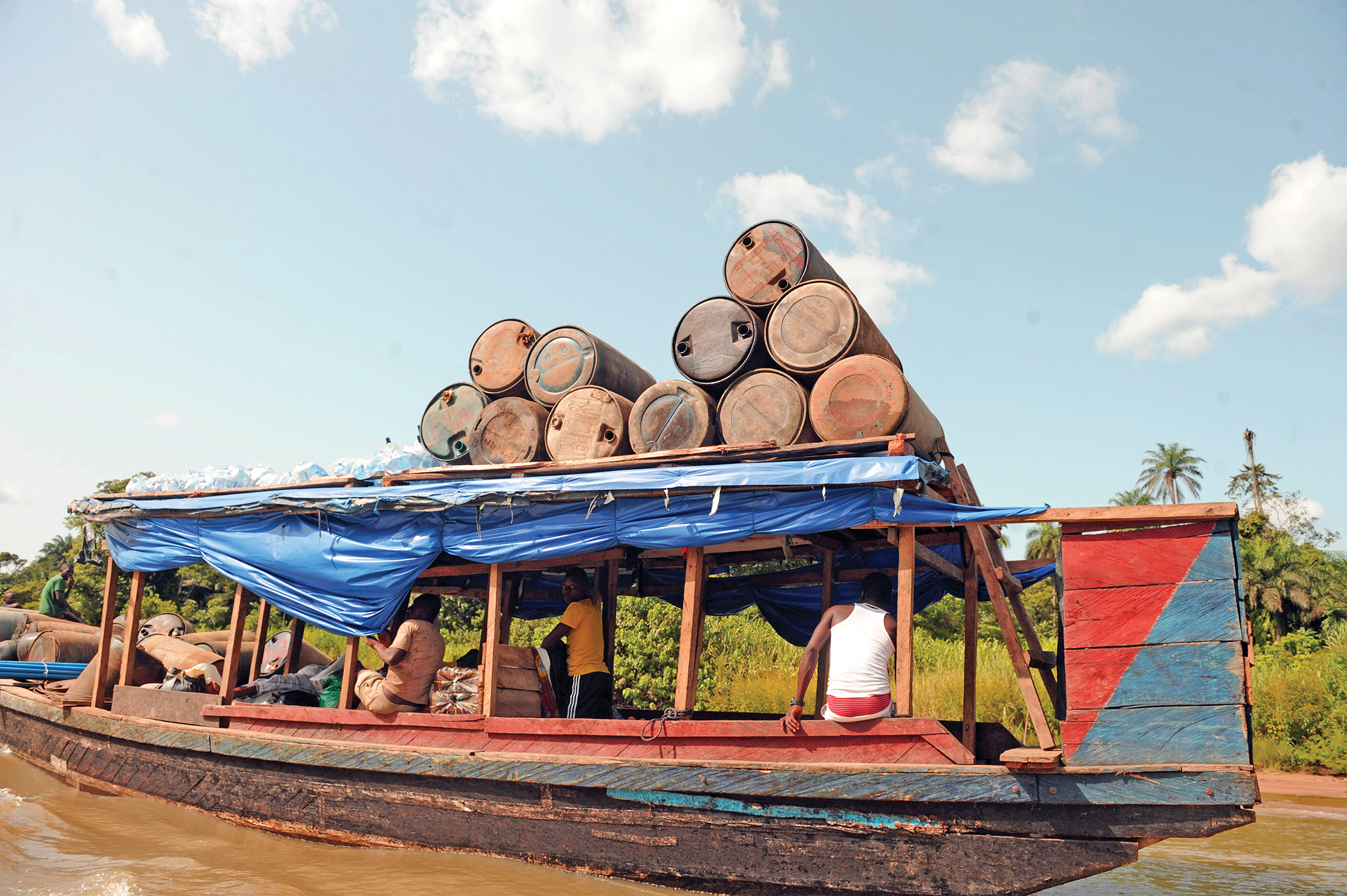
Addressing the connection between land- and sea-based crime will not be easy. The problem can be multifaceted, with one distinct type of crime connected to another.
Serge Rinkel, program manager for Borderpol, a nonprofit border security organization, told a CAMSA audience that much of the lawlessness in the Gulf of Guinea region began with oil crime and expanded to exploit weak borders and long-standing smuggling routes. Organized crime is targeting Africa because of its natural resources, Rinkel said, and often a wide range of crimes are connected: drug, weapons and human trafficking; oil theft; and money laundering. When thieves steal something, such as oil, it means they have a market for selling or trading it.
“When there is criminal activity, there is another activity connected every time,” Rinkel said.
THREATS EXPECTED TO SPREAD
What once was seen solely as a Nigerian problem is now attracting attention up and down the coast of West Africa. As more and more countries get into the oil and gas business, they will attract the kinds of criminals so often identified with Nigeria, said Joana Ama Osei-Tutu, a research associate with the Kofi Annan International Peacekeeping Training Centre.
Ghana is developing its oil industry, and Côte d’Ivoire, Liberia and Senegal are among countries searching for oil, Osei-Tutu said. As Nigeria has increased security along its coast, pirates and thieves “have to find a way of moving away from the secured area to the unsecured areas, and so it started to shift gradually, and it just has gone on.”
In some cases, Osei-Tutu said, thieves will hijack oil tankers in Nigeria and sail all the way out to Côte d’Ivoire to siphon the oil. If naval forces secure those areas, “then they will try Liberia, and then they will try Guinea and then Sierra Leone to see where they can easily offload their cargo.”
Any country that becomes lax in its security will become a haven. So it’s important that nations take comprehensive measures now. Countries may not be able to patrol their exclusive economic zones around the clock, Osei-Tutu said, but they need to give the perception that they are there and have eyes on the sea.
ESTABLISHING A MARITIME PRESENCE
The CAMSA conference and Exercise Obangame Express focused on overcoming sea blindness and establishing a robust maritime presence. Lt. Cmdr. Eddy Omokhodion of the Nigerian Navy manages a marine operations center in his home country through which the Navy can track ships at sea with the SeaVision computer program. When two ships end up close together, it’s worthy of scrutiny because it could mean a ship-to-ship transfer of oil is taking place.
Also, naval officials can track the routes of vessels. Omokhodion said cargo vessels typically move in a straight line. “Somebody who is not drunk will move straight,” he said. But when a cargo vessel begins to take on a zigzag route with several stopping points, it’s worthy of investigation. That could indicate a rendezvous with a co-conspiring vessel.
Monitoring equipment and naval assets will bolster the fight against oil crime — and other maritime threats — but the capacity to procure and deploy better assets varies widely in the Gulf of Guinea region. Not even some of the better-equipped forces, such as Ghana’s, have all the resources they would like. Ultimately, having a good eye on the sea and cooperating across borders will be a key to success, participants agreed.
“So I do not have enough assets now, but I also know that I don’t need to have enough to be able to be effective,” said Rear Adm. Geoffrey Biekro, Ghana’s chief of naval staff. “That is why we are collaborating in the subregion. Yes, Nigeria has some [offshore patrol vessels]; Benin also has some fast battle boats. We believe that when we pool these resources together, we will be more effective.”
Operation Pulo Shield Cracks Down on Oil Crime
Nigeria has wrestled with numerous problems since the discovery of crude oil in 1956, namely theft and the destruction of oil-related infrastructure. Since 2012, the military’s Joint Task Force (JTF) has been taking action to address these problems.
At that time, the government authorized the JTF to go after oil thieves in the creeks and waterways in nine states of the Niger Delta, according to the newspaper Vanguard. The effort is called Operation Pulo Shield. Pulo is an Ijaw word that means oil.
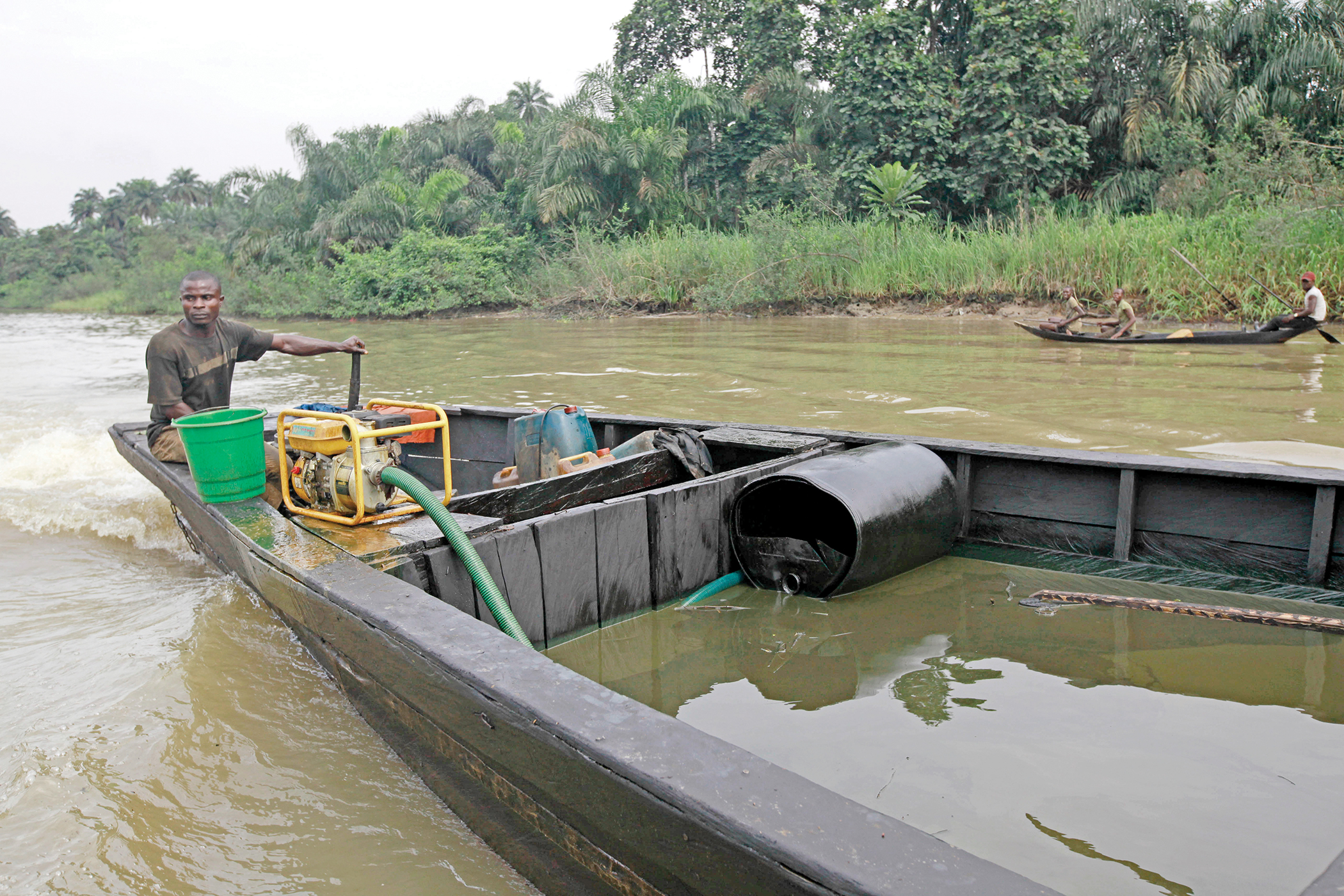
A June 2014 Reuters report showed that Nigeria was losing about
$35 million a day from oil theft — a quarter of the nation’s revenue. Estimates have placed the daily loss at between 100,000 and 600,000 barrels. Nigeria has a maximum crude oil production capacity of 2.5 million barrels per day, according to the Nigerian National Petroleum Corp.
Rear Adm. Usman Jibrin, Nigeria’s chief of naval staff, reported in March 2015 that his forces apprehended 84 vessels, arrested 155 suspected oil thieves, and destroyed 120 illegal oil refineries, 29 barges, 93 boats and more than 1,200 pieces of equipment and tools used by oil thieves in 2014, according to The Punch newspaper.
In 2013, the JTF reported that it had killed 82 pirates and robbers, killed 23 kidnappers, and conducted 1,025 anti-bunkering patrols that led to the destruction of 1,951 illegal refinery camps and the arrest of 1,857 thieves, according to Maritime Security Review. JTF operatives also destroyed more than 1,117 Cotonou boats, 82 tanker trucks, 81 barges and 1,873 surface tanks.
Despite its successes, the JTF has met with criticism. An October 2013 report by Stakeholder Democracy Network said that a few high-ranking JTF officers had ties to “tap point owners, oil theft unions and camp managers,” according to Nigeria’s Premium Times.
“During the tapping process, the JTF ensure the surrounding waterways are clear so workers can install the tap without disturbance,” the report said. The report also said low-ranking officers share in “transportation taxes” from distribution vessels.
“In term of discipline, there is no organization that is devoid of black sheep,” Nigerian Maj. Gen. Johnson Ochoga told Premium Times in January 2013. “But we have sustained our zero tolerance to crimes.”
“JTF cannot be complicit in oil theft. If there is no oil, our salaries will not be paid, so we defend it with our lives,” JTF spokesman Col. Onyema Nwachukwu told Premium Times. “We are passionate about our mandate because it is not just the right thing to do but also because we must save our country from the ineptitude of some of our countrymen who are hell-bent on plunging our nation into an abyss of economic unsustainability. It is a serious national security challenge, when a nation’s economic means of survival is threatened.”

